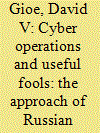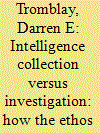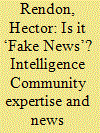| Srl | Item |
| 1 |
ID:
161534


|
|
|
|
|
| Summary/Abstract |
The following article demonstrates how the 1945–6 Gouzenko Affair and the 1976 Montreal Olympics contributed to Canada’s integration into global intelligence-sharing networks. It also argues that the Olympics instigated a significant shift in national security priorities in Canada from communism to international terrorism. It is based on more than 2000 pages of documents released by the British government related to the Gouzenko Affair as well as over 50,000 pages of RCMP records on the security plan for the Montreal Olympics.
|
|
|
|
|
|
|
|
|
|
|
|
|
|
|
|
| 2 |
ID:
161529


|
|
|
|
|
| Summary/Abstract |
This article argues that Russian intelligence has achieved recent success in influencing democratic elections and referenda by combining the traditional Human Intelligence (HUMINT) discipline of manipulating useful fools with cutting edge cyber tactics, including hacking, phishing, social engineering, and weaponizing purloined information. This essay further argues that this synthesis yields greater effects than the sum of its parts. Given its potency, democracies and NATO members should expect to confront this type of threat more often. The 2016 American presidential election is used as a case study to conceptualize Russian hybrid intelligence, a new term reminiscent of Soviet ‘complex active measures’ and updated for the twenty-first century.
|
|
|
|
|
|
|
|
|
|
|
|
|
|
|
|
| 3 |
ID:
161532


|
|
|
|
|
| Summary/Abstract |
What does the ‘war on terror’ mean in a volatile local context in which soldiers have scant knowledge of the terrain and the identity of an adapting and potent guerrilla force that resembles the noncombatant population? This overriding question is addressed through a field-based study of the Civilian Joint Task Force (Civilian JTF) in northeastern Nigeria, a hybrid vigilante network of local ‘youth with sticks’ (kato da gora) and local hunters (yan faratua) working closely with the Nigerian military to identify and capture members of Boko Haram in their communities and in the surrounding bush. The article underscores the key role of the Civilian JTF as ‘knowledge brokers’ in sharpening up the counterterrorism surveillance of the Nigerian military.
|
|
|
|
|
|
|
|
|
|
|
|
|
|
|
|
| 4 |
ID:
161535


|
|
|
|
|
| Summary/Abstract |
There is an inherent tension between a law enforcement–driven approach and a requirementsdriven approach to intelligence collection. The US experience, with the development of the Federal Bureau of Investigation(FBI), as the primary intelligence service within the domestic environment, suggests that the tension is nearly insurmountable if an organization starts from a reactive, threat-focused posture. As a law-enforcement agency, which US government decision-makers expect to fulfill an intelligence function, the FBI is triply handicapped by the external strictures of the Department of Justice (DoJ); the Bureau’s own policies – which respond to the DoJ parameters; and the FBI’s organizational culture.
|
|
|
|
|
|
|
|
|
|
|
|
|
|
|
|
| 5 |
ID:
161533


|
|
|
|
|
| Summary/Abstract |
Self-communication platforms have generated a myriad of outlets and news producers that represent a challenge for modern societies. Therefore, it is relevant to explore new measurements that can help understand whether a specific outlet disseminating news could be considered reliable or not. This study is based on the expertise from the U.S. Intelligence Community to offer a statistical model that replicates the reliability measurements based on intelligence expertise. The results suggest that a classification algorithm could be useful to measure news media reliability. Additionally, different variables were identified to predict perceptions of media reliability.
|
|
|
|
|
|
|
|
|
|
|
|
|
|
|
|
| 6 |
ID:
161531


|
|
|
|
|
| Summary/Abstract |
Intelligence agencies routinely use surveillance technology to perform surveillance on digital data. This practice raises many questions that feed a societal debate, including whether the surveillance technology is effective in achieving the given security goal, whether it is cost-efficient, and whether it is proportionate. Oversight bodies are important actors in this debate, overseeing budgets, legal and privacy matters, and the performance of intelligence agencies. This paper examines how oversight bodies evaluate the questions above, using documents produced by American and British oversight mechanisms.
|
|
|
|
|
|
|
|
|
|
|
|
|
|
|
|
| 7 |
ID:
161530


|
|
|
|
|
| Summary/Abstract |
A few years into the Iraq War, those engaged in that fight realized that the methods of intelligence analysis, refined in Cold War, were not sufficient for wartime. To manage the massive increase in intelligence data new analytic tools were adopted for unearthing and connecting key developments and individuals hidden from view within it. Only then could the secret networks of Iraqi insurgents be uncovered. Several of these changes were put into practice by the US counterterrorism force that deployed to Iraq as Task Force 714. The study describes what these changes encompassed, and how they were employed to support those given the mission of attacking and dismantling Al-Qaeda in Iraq’s networked underground.
|
|
|
|
|
|
|
|
|
|
|
|
|
|
|
|
| 8 |
ID:
161536


|
|
|
|
|
| Summary/Abstract |
Since the major British banks first purchased computers in the 1960s, they have been concerned with the security challenges that these machines presented. One of the most potent risks was TEMPEST, the discovery that computers emitted radiation which could reveal the content of information processed by them, even if it had been encrypted. Archival material recently uncovered within the Bank of England’s archives from the mid-late 1970s is presented here to provide a first look at how the Bank evaluated the credibility of the threat posed by TEMPEST and how it sought to manage this new risk.
|
|
|
|
|
|
|
|
|
|
|
|
|
|
|
|